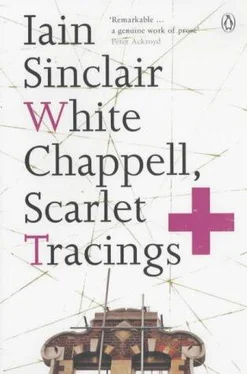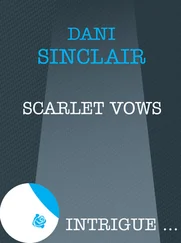‘All crap,’ Dryfeld announces, unnecessarily.
‘You guys!’ Mossy remarks, world-weary, but with something of admiration in his tone. ‘You fucking guys.’
He succeeded in spearing a spectacularly colourful glob of snot and prodded it across the counter. It was speckled like granite. He’d probably have it set into a signet ring.
‘You’re too fucking much.’ He killed a bottle of room temperature Lucozade, spun open the cap on another.
Dryfeld, totally ignoring the prices inscribed in the books, which bore no relation to their value, at auction, by catalogue, or any other method of trade known to humanity, started to put a heap of ‘possibles’ on the counter, ‘for negotiation’. He’s quite prepared to talk it through to dawn; or until the first shop opens in Hendon. Or until Mossy’s screaming cells demand another anodyne fix. Whoever talked about getting high hadn’t met Mossy. He absorbed, sweated, continued. He looked like an ill-shaved bison but he had a will that could only be measured in geological time. His stock might need carbon dating, but he wouldn’t crack.
First edition dealers are interested in nothing but condition, they couldn’t care less about the title or the contents so long as the book is fine, mint, untouched, intact, a second time virgin: they wouldn’t have a prayer here.
But Nicholas Lane is resilient, he starts to work through a mess of Horner’s Penny Stories for the People , so well-tanned they’re oven ready; pausing to examine one copy closely. He hasn’t blinked since they got out of the car: his pupils enlarge by a couple more points. He snatches up the whole pile, putting them under his arm. Then rapidly selects a hand of terminally distressed Austin Freemans, a ‘Lost Race’ yarn, lacking front free endpaper, a romance set in Burma, and a Jonathan Latimer paperback for his own use. Nicholas Lane and Dryfeld were remarkable figures in the book trade: they could both read, a book a day, between shops. The speed of Lane’s decisions was breathtaking and those who know him will recognise that he has made a find. All of the other choices are wrapping paper and can be painlessly junked.
The Late Watson is somewhat languid. The shop looks uncomfortably like a diagram of his stomach. He began to hallucinate. The room extended into the dreadnought hulk of Ripon Cathedral. It was raining, or the roof was melting. The pews were stacked with untitled proof copies, a thousand to every row, and somewhere in amongst them Graham Greene’s own copy, the original version, of Brighton Rock , with all the period racism not yet expurgated. He needed to run his head under a tap. He blundered through the main body of the shop, up some steps, into the back room.
The bowl of the lavatory was filled with painted female faces. Titles like Blue Blood Flows East, Lady — Don’t Turn Over , floated sodden on the surface. The Science Fiction titles were spread over the floor, along with a good supply of used and unused needles. Crunch across them, like walking on locusts. There is no light, he has a torch in his pocket, ready for winter morning markets, for nipping into forbidden cellars and peeping through the keyholes of locked rooms. Spots a tolerable copy of The Anubis Gates by Tim Powers, published 1985 at £9.95 and modestly marked up by Mossy to £15. That’s OK. He can get £40 for it. Picks up half a dozen others to jettison when they negotiate. Back to the shop, one sleeper, an inscribed copy of Peter Ackroyd’s Hawksmoor for a fiver: which brings him up to his day’s target.
The sole advantage of Mossy’s shop is that he does not offer coffee to dealers. This form of politeness has wrecked more stomachs than the combined forces of all the fast food dead-chicken combos.
‘You’re putting me on, man. This lot comes to £238 — I’m saying you can have them for £210. Two hundred. And ten. Pounds. What do you want, man, me to give them to you? For Chrissakes, man!’
Mossy’s indignation is perfectly assumed, almost genuine. He falls back, breathless.
Dryfeld, unmoved. ‘£60. Best offer.’
‘Get out of here! You know what they catalogue at? Are you serious ?’
‘Sixty quid. Take it or leave it.’
‘I’m giving you nearly three hundred fucking quids worth of books, where else in this world are you even going to see these books? Giving, at £200. What you want? Bastard! You want to fuck my wife and kids as well?’
‘Sixty quid.’
Mossy swills Lucozade, dribbling orange bubbles into the cleft of his chin. Shrugs, half turns, appeals to the narrator, to Nicholas Lane who is performing various self-contained operations with cigarettes, resinous shavings, and a box of Mossy’s matches.
‘OK, guys, back to my house. Time? You’ve got time. Where else is open? My house. I’ll show you more stuff. Can you believe him? A fucking skinhead gorilla! £120 for three hundred pounds worth of books on fucking Red Indians, I throw in the needlework. Listen, man, don’t think you can tell me anything about Indians. I took courses with Olson at Buffalo, man. The fucking Library of Congress would fly over at that price. You want me to ring them?’
He grabs the amputated telephone and shoves it in Dryfeld’s face.
‘Bastard still wants to fuck about. I should have killed him the last time.’
‘Sixty.’ Dryfeld paces, uneasy in a room without newspapers.
You can climb up from the river through narrow passageways, where Dryfeld’s shoulders brush the algae from the damp walls, grey snow-melt leaking into Nicholas Lane’s paper-thin shoes; in spasm, through the secret intestines of the town. They pass, and ignore, the slumped shadow of Jamie, a smear on the pub window, dosing himself with Jamesons and cola chasers.
Mossy Noonmann’s wife is not made radiant by the prospect of her husband returning, no deal set, three half-crazed book-dealers at his heels, with their bundles of paper, their saurian determinism. The TV-set is on but the rest of the furniture has been wasted. Two small pale children of undetectable sex sit a yard from the set, not noticeably well-fed, though their unmatched pyjamas are witness to meals having been taken at some point in their recent history, involving plentiful use of the sauce bottle. Lank-haired and mute: they outstare the electronic fishtank.
The wife withdraws to practise what sounds like an advanced course in arc-welding in the kitchen: the negotiations continue. Dryfeld takes out a fat roll of notes and starts counting the sixty in fivers.
‘I’m asking one hundred pounds. You want to steal four hundred pounds worth of books, OK. Steal the fuckers. It’s your karma, baby.’
Before Mossy can grab the cash his wife’s hand appears, it’s gone, she’s gone, his performance of animation collapses, he nods out, shivers, turns down the sound on the TV; the carnage and mania is leaping in rabid cuts behind him, as if it was all escaping from just inside his eyelids. The children do not object, or move. The wife materialises once more.
‘Dick-head!’
Turns the sound back up, to the top. The windows shudder. The front door has been left open and the demented yelps and barks invade the otherwise silent street.
Dryfeld packs his Smithsonian Indians into a canvas holdall, straps running underneath for extra strength, sign of the professional runner.
Nicholas Lane can sense the narrowing of the lumen of the pylorus, the first delicate, almost sensual, ripplings of pain, the foretaste of vomit in the throat, Proustian recall, Glaswegian Dal Mosola about to resurface. He goes through the palest form of argument, cutting Mossy’s tenner to eight quid, agreeing a bulk price for the Penny Stories that anybody less desperate than Mossy would have junked to Oxfam. He makes it onto the frozen grass and sprays two or three pints of old food into an ornamental flower-bowl.
Читать дальше












